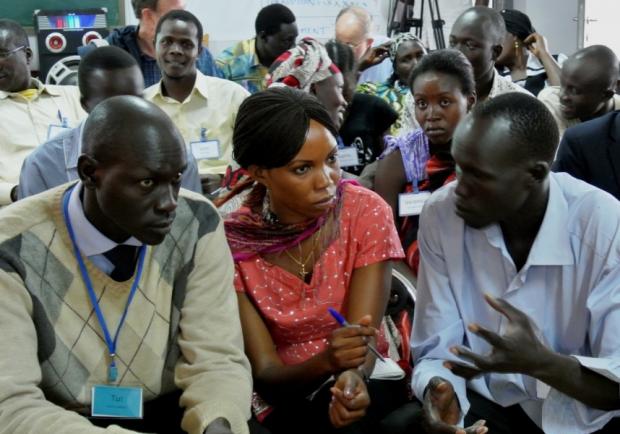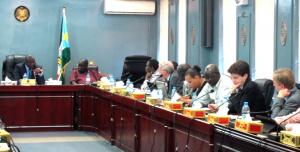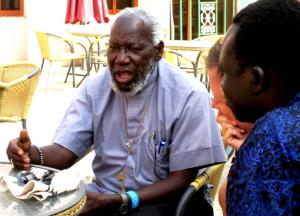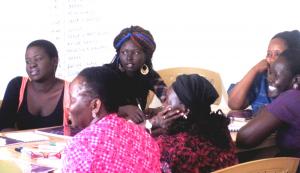An unfolding journey

‘Disappointment is a factor of expectation,’ said Acuil Malith Banggol, veteran of South Sudan’s long march to independence and nationhood, summing up five months of the government-led initiative for national reconciliation.
An impressively tall 6’11” (2.1 m), ‘Comrade’ Banggol saw much of that long march as a foot-soldier in the Sudan People’s Liberation Army (SPLA). In the late Eighties, he was transferred to lead its relief and aid wing, keeping populations alive through years of hardship. Today he is a Secretary of the SPLM, the political party now in power, responsible for Popular and Syndicated Organizations.
With some 2.5 million dead and untold stories of suffering, Banggol and his comrades witnessed a multitude of ‘disappointments’ before they could reach their ‘expectation’ of independence in July 2011. Real peace is yet to come.
Which is why, on 24 November 2012, Vice President Dr Riek Machar Teny announced that ‘the leadership of the 15-month old nation’ would organise a first-ever peace and national reconciliation conference ‘to try and heal the mental wounds that have visibly divided some of the communities over the years’.
Seven years after the Comprehensive Peace Agreement, signed with Sudan’s government in Khartoum, the time had come when ‘the country should reconcile with its own past.’
The conference would draw together hundreds of participants from the top leadership in the national capital, Juba, as well as from the ten states in the country, Dr Machar told a preparatory meeting in the Council of Ministers hall.
It was a bold vision.
Requests for international help to implement the vision had been made by Dr Machar and other South Sudanese attending IofC conferences in India and Switzerland earlier last year. In response, last August the Global Assembly of IofC International endorsed a ‘framework proposal’, drafted by South Sudanese and Africans present, to make this a Common Action for the IofC network during 2013. IofC International was formally invited to partner in the project. A detailed 56 page proposal was formulated and funding sought. In February 2013 an advance team of eight arrived to support the local team of IofC South Sudan and the Organizing Committee appointed under the Office of President to plan the conference.
But because of the shut-down of oil exports through Sudan, severe austerity measures meant that none of the USD 2.6 million passed by the Council of Ministers in January could be released. By mid-March, it became obvious that – even with a substantial grant from the Swiss government through its Foreign Affairs department -- lack of finance, combined with lack of organizing capacity on the ground, meant that the planned national conference for 1500 national and international participants could not take place as scheduled in mid-April. It was postponed till June. In fact, 4 June, the date of writing this article, was to have been the last day of the conference, launching a five-year process for national reconciliation across the country. One more expectation has suffered disappointment.
What happened?
 By late March, the Organizing Committee had been expanded with representatives from the Sudan Council of Churches, civil society and non-government ‘intellectuals’ like Acuil Banggol. At a meeting chaired by the Vice President, the Committee revised the concept to a ‘consultative conference’ in June to be followed by an extensive process of consultation across all ten States culminating in the formation of a non-government National Council for Healing and Reconciliation by the end of 2013. At the same time, the Committee agreed that most of the 80 international participants – recruited and prepared by IofC International – should stick to their original April travel dates to help kick-start the process through a series of tried and tested IofC workshops, engaging national leaders and organizations in Juba.
By late March, the Organizing Committee had been expanded with representatives from the Sudan Council of Churches, civil society and non-government ‘intellectuals’ like Acuil Banggol. At a meeting chaired by the Vice President, the Committee revised the concept to a ‘consultative conference’ in June to be followed by an extensive process of consultation across all ten States culminating in the formation of a non-government National Council for Healing and Reconciliation by the end of 2013. At the same time, the Committee agreed that most of the 80 international participants – recruited and prepared by IofC International – should stick to their original April travel dates to help kick-start the process through a series of tried and tested IofC workshops, engaging national leaders and organizations in Juba.
By then, an experienced IofC International training team, including eight from the IofC Workshop for Africa programme, was already on the ground preparing a four-week training of 200 ‘Peace and Reconciliation Mobilizers’. It had been requested at short notice by the Vice President. A dozen local facilitators were being trained in the basics of IofC and team leadership. Following laid-down criteria, a selection team worked for days to select 15 representatives from each State, as well as 50 more from civil society and faith-based groups. Coordinating and transporting them on the United Nations system of interstate flights in time for the start of the training in early April was a logistical nightmare, assisted by the government’s Peace and Reconciliation Commission. With not much more than promises of finance being raised by IofC South Sudan, booking accommodation and training facilities became a leap of faith – or, some felt, recklessness. As participants arrived – including a Bishop, a SPLA General, an MP, political activists and village farmers ranging from 70 years old to a two-month old baby – adapting to cultural perceptions and pressing medical issues presented daily obstacles for the training team.
Yet a month later, when the Minister for the Office of President Emmanuel LoWilla handed out graduation certificates, the lives and relationships among most of those 200 were significantly impacted. Several from opposing clans and ethnic groups had found trust and forgiveness for the first time, dissolving prejudices. One political party activist, highly critical of the training during the first weeks, apologised to someone of another ethnic group, causing a storm of reactions. As a communist, he had resisted religion. But he thanked the Imams and the Pastors among the participants for their daily morning prayers, which had opened the door of prayer for him again. Another man phoned an enemy who had beaten him when he was young, seeking forgiveness for his hatred. The stories continued in feedback for weeks after the programme ended.
Evaluating this training, its impact and sustainability, is being carefully done and will take time. But the fact it took place at all was, according to Presidential Advisor Tor Deng Mawien who chaired the Organizing Committee, ‘a great achievement... peace is moving across South Sudan on 400 feet.’
Presidential decrees
 Half way through the training programme, however, it was in danger of being cancelled. On 15 April, just days before 33 international speakers and facilitators were due to arrive in Juba, a decree from HE President Salva Kiir Mayardit was read on national television, suspending the National Reconciliation conference and dissolving the Organizing Committee. Next day, in an atmosphere of uncertainty and tension, the programme for the 200 Peace and Reconciliation Mobilizers stopped for a day until a further communique from the President directed that it should continue to its conclusion. Participants leapt with joyful dancing and singing.
Half way through the training programme, however, it was in danger of being cancelled. On 15 April, just days before 33 international speakers and facilitators were due to arrive in Juba, a decree from HE President Salva Kiir Mayardit was read on national television, suspending the National Reconciliation conference and dissolving the Organizing Committee. Next day, in an atmosphere of uncertainty and tension, the programme for the 200 Peace and Reconciliation Mobilizers stopped for a day until a further communique from the President directed that it should continue to its conclusion. Participants leapt with joyful dancing and singing.
Meanwhile the conference team had been contacting the international travellers, cancelling their travel. In a tense atmosphere, it was clear that the nine workshops and forums planned for the coming weekend could not continue. Thirty politicians had been lined up to attend a workshop on Peacebuilding Leadership in Traumatised Societies. The Chief Justice and Minister of Justice had accepted to host meetings on Transitional Justice. Women’s leaders and Ministers had been lined up for a Creators of Peace forum. The Farmers Dialogue had scheduled three days at the University of Juba. Senior police, army and security personnel were expected for a briefing on the Moral Foundations for Democracy (IofC training used in Sierra Leone). Senior civil servants were preparing to host an assessment by the IC centre for Governance from India. In a few hours they were all cancelled.
No reasons were given for the suspension, though mixed commentary and criticisms of the reconciliation process, and political issues around the leadership of it, had been mounting in newspapers and on website for some weeks. The first objective of the joint proposal for a ‘Journey of Healing for National Reconciliation’ (as the campaign was named) was ‘to generate momentum for national reconciliation and good governance, raising them as priorities on the national agenda’.
Objective achieved
That aim was achieved in the most unexpected and controversial way. Reconciliation is solidly on the national agenda. A week after his first decree, President Salva Kiir issues a subsequent order for the ‘formation of the National Reconciliation Committee for Healing, Peace and Reconciliation Conference, 2013’, led by four prominent Churchmen, a representative of the Muslim community, one person from each of ten States, and representatives of women’s, youth and civil society organizations.
The following day the President, in his speech opening a session of the National Assembly, had stressed that a process of reconciliation was ‘imperative’ for his country: ‘We must work to heal the wounds created during our long struggle for independence and equality... As President, this is one of my priorities for this young nation. But we must create an inclusive and people-driven process in order to achieve true reconciliation.’
Three days later, he received four of the IofC International team in his office, thanking them for their efforts. Repeating the importance of ‘an inclusive and people-driven process’, the President said he was concerned that, without neutral non-political leadership, the reconciliation process would not achieve peace. Those who had a history in the conflicts of the struggle, himself included, may be required to testify as part of the process, so it needed to be led completely independent of national politics.
 As directed by his decrees, the old Organizing Committee assembled all documents for a handover ceremony on 4 May to Archbishop Daniel Deng Bul and members of the reconstituted Committee for National Reconciliation. ‘This work needs all of us to be involved,’ said the Archbishop, thanking those who had worked to promote reconciliation. ‘What you have already laid down cannot be torn down. You are going to be part of us.’
As directed by his decrees, the old Organizing Committee assembled all documents for a handover ceremony on 4 May to Archbishop Daniel Deng Bul and members of the reconstituted Committee for National Reconciliation. ‘This work needs all of us to be involved,’ said the Archbishop, thanking those who had worked to promote reconciliation. ‘What you have already laid down cannot be torn down. You are going to be part of us.’
At earlier meetings with the IofC team, the Archbishop had recounted stories of how prayer and courage had brought peace at several critical moments in negotiations. Speaking to the 200 Mobilizers two days before the end of their programme, he had told them: ‘If you are struggling on behalf of those who cannot speak, you need to change, because God listens to those who are changed from within… Only if you deny yourself can you truly speak for those who have no voice.’
On behalf of the new Committee, he wrote formally to invite the help of Initiatives of Change International ‘in the area of training… organized at the grassroots from boma (village) … up to state and national level’.
Those from IofC International are already in a process of evaluating these further requests and challenges ahead. They work with and through their partners in IofC South Sudan who have established a strong network over these months. A delegation of South Sudanese, expected to attend the conferences during July in Caux, Switzerland, will help shape the way ahead.
Disappointments have been real, of course. So has the gratitude felt for the engagement with new-found friends and ‘comrades’, and the support of many around the world for this IofC ‘Common Action’. The chance of serving a people and country in great need seems a privilege, not a burden. And something larger than plans and projects keeps expectations alive, within the country and abroad.
A symbol of this tenacity might be three-year old Reuben. Picked up by the Non-Violent Peace Force volunteers in Jonglei State – where current ethnic conflict has caused thousands of casualties and 30,000 fleeing the fighting – he had survived three bullet wounds to his small body while his mother and a sibling lay dead beside him. Brought to Juba, he was given very basic medical care and dispatched into the care of relatives. Kathryn and Nyok Gor, two of the international team from Australia, spent days trying to get adequate medical analysis of his internal injuries in an attempt to save his life. Miraculously, scans showed that no vital organs were affected. He was treated and now is walking and talking. Reuben refused to die.
The Republic of South Sudan, not yet two years old, bullet-scarred and suffering tragic losses, still survives. And so does its tortuous journey towards reconciliation and development. As another of our IofC team put it, we are seeing the unfolding, not the unravelling, of God's plan for healing in this land.
-- by Mike Brown, on behalf of the Project Team from IofC International and IofC South Sudan.


